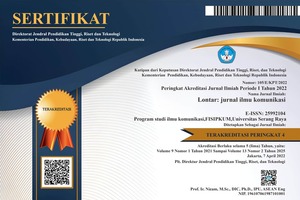PERUBAHAN PERILAKU SOSIAL MASYARAKAT BADUY TERHADAP PERKEMBANGAN TEKNOLOGI INFORMASI DAN KOMUNIKASI
DOI:
https://doi.org/10.30656/lontar.v3i1.348Abstract
Perkembangan teknologi komunikasi yang amat sangat pesat saat ini, cukup memberi pengaruh kepada masayarakat. Dalam hal ini penelitian yang dilakukan adalah tentang masyarakat suku baduy, yang notabene adalah masyarakat yang cukup terasing dari pengaruh kehidupan masyarakat di luar suku baduy, atau dalam hal ini bisa dikatakan terkena pengaruh dari masayarakat modern. Seiring berjalannya waktu, pada akhirnya apa yang diasumsikan oleh tokoh media yang terkenal – McLuhan- terbukti, yaitu dengan pernyataannya tentang “media is messageâ€. Yang membahas tentang pengaruh media yang sangat kuat (powerfull). Dan juga tentang pemikirannnya yang menganggap bahwa suatu saat nanti dunia yang sebegitu luasnya akan menjadi “global village†atau desa global, dimana dunia pada akhirnya hanya sebuah desa yang orang-orangnya sangat mudah berhubungan karena dibantu oleh adanya media komunikasi yang makin canggih.Dalam penelitian ini, teori yang digunakan adalah Media Ecology Theory, yang mengganggap pada intinya adalah masyarakat dunia akan terikat kebersamaannya oleh media. Selain itu media akan memberi pengaruh terhadap gerak dan tindakan manusia, dalam hal ini dapat dikatakan bahwa akibat dari terpaan penggunaan teknologi komunikasi akan memberi perubahan terhadap perilaku manusia. Saat ini bisa dilihat dari kebiasaan orang-orang yang cenderung tergantung pada media komunikasi. Sampai-sampai, apabila media komunikasi (seperti misalnya HP) tertinggal, maka ada perasaan seperti terkucil dari dunia. Hal ini tentu saja akibat dari gencarnya perkembangan teknologi media komunikasi, seperti yang diramalkan oleh McLuhan.Model komunikasi yang dikemukakan dalam penelitian ini adalah model interaksional dan model transaksional. Kedua model ini cukup menjelaskan tentang proses komunikasi yang terjadi dalam hubungan antara masyarakat Baduy dengan masyarakat sekitar. Proses komunikasi adalah tahapan yang terjadi dalam hubungan. Layaknya Masyarakat Baduy yang awalnya terkucil, tetapi karena proses komunikasi yang terjadi menyebabkan mereka secara sedikit demi sedikit setidaknya terpengaruh dari perilaku masyarakat sekitar yang sudah lebih dahulu terterpa oleh teknologi media komunikasi.Downloads
Published
Issue
Section
License
By submitting an article to the journal, the author(s) agree to transfer the published article's copyright to the journal, which will act as the publisher. This means the journal will have the right to publish the article in various forms, including reprints. The journal will maintain the publishing rights to the published articles.
In line with the license, authors and third parties (readers, researchers, and others) are allowed to share and adapt the material. In addition, the material must be given appropriate credit, provided with a link to the license, and indicated if changes were made. If authors remix, transform, or build upon the material, authors must distribute their contributions under the same license as the original.






